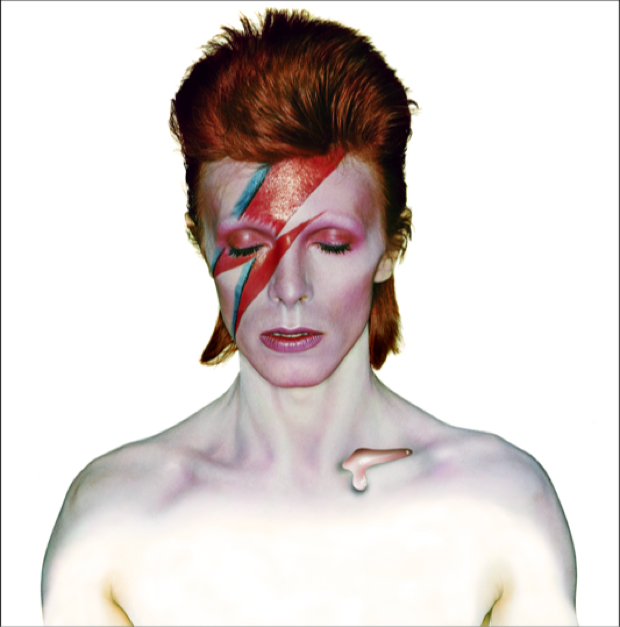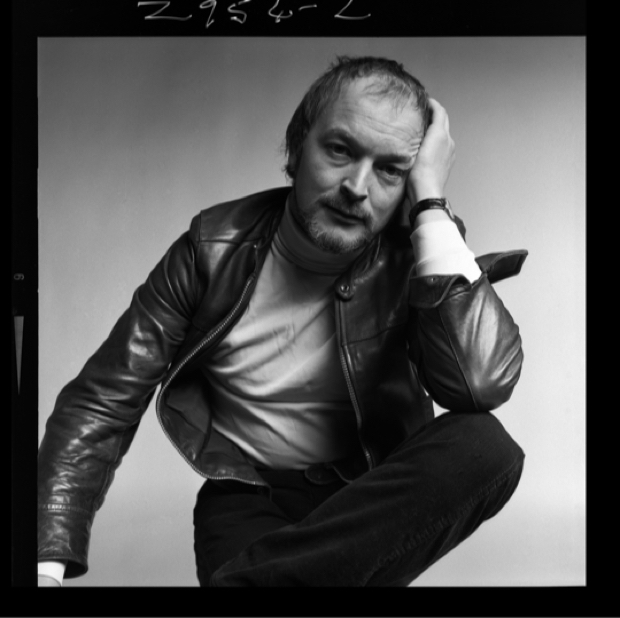Aladdin Sane: 50 Years, Southbank Centre
Aladdin Sane: 50 Years celebrates the publication of David Bowie’s epoch-making 1973 album and its emblematic cover image
Aladdin Sane: 50 Years. Photo Pete Woodhead, Photo © Duffy
Throughout his long, chameleonic career as a rock musician, David Bowie was a restless image shifter, a daring, provocative creator of new personae, each signalling a new phase in his prolific music output.
From the mod look of his early albums through his androgynous, glam rock alter ego Ziggy Stardust to the severe, controversial, Berlin-inspired Thin White Duke, and more, Bowie’s image never settled – on the contrary, it remained multifaceted, always a composite.
But it’s perhaps fair to say that none of his public personae had the kind of impact of Aladdin Sane, an image which to this day retains the power to grab and hold the viewer.

The exhibition Aladdin Sane: 50 Years, installed in the Royal Festival Hall, is a fascinating account of the creation of that image and its social context in 1970s Britain.
It is primarily the story of two men: David Bowie and the man who shot the original Aladdin Sane photographs: Brian Duffy, known to everybody simply as Duffy.

The Britain in which Ziggy Stardust morphed into Aladdin Sane was a world away from today’s: no internet, no mobile phones – in fact, we learn, only 44% of households had access to a telephone.
No Spotify or any other providers of music on demand; albums were the thing. Album covers were discreet and functional until 1967, when The Beatles’ Sgt Pepper’s Lonely Hearts Club Band revolutionised the concept of what an album cover could/should be.
And so the images gradually escort the viewer to 1973. By then Duffy was a 39-year-old photographer with an enviable record of fashion and portrait photography. His photographs of John Lennon, Michael Caine and Prime Minister Harold Wilson are displayed, as are some of his striking Vogue and Elle covers.
With Bowie tired of Ziggy Stardust and searching for his new image, Duffy seemed the ideal person to forge that image, with the help of make-up artist Pierre LaRoche, who came up with the striking red-and-blue lightning bolt across Bowie’s face.
A film playing on a loop includes extracts of an interview with Duffy, where asked whether he considers Aladdin Sane ‘a great image’ he says, no it was just ‘competent. Very competent.’
The process of photographing in a studio and sending the film off for commercial processing – no digital photography then – is described in detail; and one of Duffy’s favourite cameras, the Hasselblad 500C, made in Sweden, is displayed.
Duffy died in 2010; the exhibition is curated by his son, Chris Duffy – ‘my father’s image of Bowie is often called the Mona Lisa of pop’ – and Geoffrey Marsh, and is the centrepiece of a series of events marking the anniversary, which also serve as a reminder that David Bowie made his Southbank Centre debut in 1969.
Find details of all the events here.
From the mod look of his early albums through his androgynous, glam rock alter ego Ziggy Stardust to the severe, controversial, Berlin-inspired Thin White Duke, and more, Bowie’s image never settled – on the contrary, it remained multifaceted, always a composite.
But it’s perhaps fair to say that none of his public personae had the kind of impact of Aladdin Sane, an image which to this day retains the power to grab and hold the viewer.

Aladdin Sane 1973. Photo Duffy © Duffy Archive & The David Bowie Archive
The exhibition Aladdin Sane: 50 Years, installed in the Royal Festival Hall, is a fascinating account of the creation of that image and its social context in 1970s Britain.
It is primarily the story of two men: David Bowie and the man who shot the original Aladdin Sane photographs: Brian Duffy, known to everybody simply as Duffy.

Brian Duffy © Duffy Archive
The exhibition is laid out over several rooms with Bowie's music playing softly in the background, and profusely illustrated with images of the time side by side with panels that contextualise them.The Britain in which Ziggy Stardust morphed into Aladdin Sane was a world away from today’s: no internet, no mobile phones – in fact, we learn, only 44% of households had access to a telephone.
No Spotify or any other providers of music on demand; albums were the thing. Album covers were discreet and functional until 1967, when The Beatles’ Sgt Pepper’s Lonely Hearts Club Band revolutionised the concept of what an album cover could/should be.
And so the images gradually escort the viewer to 1973. By then Duffy was a 39-year-old photographer with an enviable record of fashion and portrait photography. His photographs of John Lennon, Michael Caine and Prime Minister Harold Wilson are displayed, as are some of his striking Vogue and Elle covers.
With Bowie tired of Ziggy Stardust and searching for his new image, Duffy seemed the ideal person to forge that image, with the help of make-up artist Pierre LaRoche, who came up with the striking red-and-blue lightning bolt across Bowie’s face.
A film playing on a loop includes extracts of an interview with Duffy, where asked whether he considers Aladdin Sane ‘a great image’ he says, no it was just ‘competent. Very competent.’
The process of photographing in a studio and sending the film off for commercial processing – no digital photography then – is described in detail; and one of Duffy’s favourite cameras, the Hasselblad 500C, made in Sweden, is displayed.
Duffy died in 2010; the exhibition is curated by his son, Chris Duffy – ‘my father’s image of Bowie is often called the Mona Lisa of pop’ – and Geoffrey Marsh, and is the centrepiece of a series of events marking the anniversary, which also serve as a reminder that David Bowie made his Southbank Centre debut in 1969.
Find details of all the events here.
TRY CULTURE WHISPER
Receive free tickets & insider tips to unlock the best of London — direct to your inbox
| What | Aladdin Sane: 50 Years, Southbank Centre |
| Where | Royal Festival Hall, Southbank Centre, Belvedere Road, London, SE1 8XX | MAP |
| Nearest tube | Waterloo (underground) |
| When |
06 Apr 23 – 28 May 23, 10:00 Late opening Wed to Sun: 10:00 to 20:00 |
| Price | £5 (free for members) |
| Website | Click here to book |